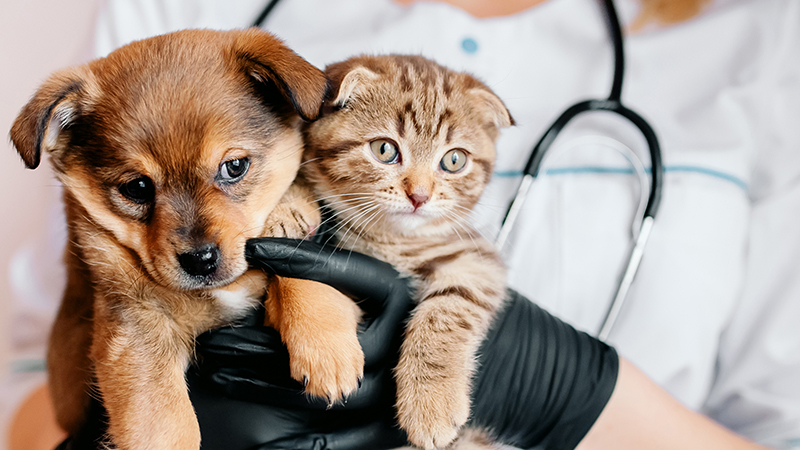
Congrats on the newest addition to your family! Whether you have recently adopted a playful puppy, or a feisty kitten, being a pet owner is always rewarding. To help you navigate this new journey, we have created a guide to educate you on puppy and kitten health, care, and training. Of course, we will also give you some insight into why we think pet insurance is a must for puppies and kittens. Get ready to enjoy many more snuggles, slobbery smooches, and the occasional “oopsies” in your future!
How to pet-proof your home
Bringing home a new pet is just like having a toddler in the house. Puppies and kittens love to explore (and chew on) everything in sight. Some ways you can help them avoid accidents are by:
-
Storing toxic foods, plants, and household items out of reach (think chocolate, grapes, tulips, lilies, cleaning supplies, the list goes on...)
-
Secure all electrical cords and get any choking hazards out of reach. Remember that anything, and everything can look like a toy to a young pet!
-
Provide them with plenty of distractions to protect your furniture, carpets, and shoes (think scratching posts for kittens or chew toys for pups).
Schedule regular vet visits & vaccinations
One of your first stops as a new pet owner will be the vet! Regular check-ups and staying up to date on vaccinations can help catch potential health issues early and prevent unexpected issues in the future.
Some of the common vaccinations your vet may recommend are:
-
For puppies/dogs: Rabies, distemper, parovirus, and bortadella
-
For kittens/cats: Rabies, feline leukemia, and feline panleukemia (distemper).
Tip: It is also important to ask your vet about preventive care options like flea and tick treatments, spaying/neutering, and heartworm medications.
Nutrition & feeding
Just like us, puppies and kittens need a balanced diet to grow strong and live a long, healthy life. Consider these tips while curating your new pet’s diet:
-
Choose high-quality food, with as many real ingredients as possible (avoid fillers like corn and soy). Your vet can recommend brands and products based on your pet’s needs.
-
Only feed your pet age-appropriate formulas.
-
Puppy and kitten food brands have different nutritional value, and so do adult food formulas.
-
Monitor portion sizes. Overeating can lead to pet obesity, which can lead to health issues. The product label on your pet’s food will advise on correct amounts according to their weight.
-
Watch for signs and symptoms of allergies. Food allergies are common in pets. Symptoms of allergies to look out for include: excess itching, redness of skin, ear infections, and gastrointestinal problems like gas or diarrhea.
Training & socialization are important
While it may seem daunting at first, proper training will make life much easier for you and your pet in the long run. We suggest starting with the basics, listed below, and working your way up to more advanced skills.
-
Potty training: The key to house training is consistency! Reward good behaviour with treats and affection. We also recommend having some pet odor cleaner on hand...
-
Basic commands: If you have brought home a new pup (or a very smart kitten), start with simple tricks like “sit”, “stay”, “shake a paw”, and “come” using paws-itive reinforcement.
-
Socialization: Whether you are introducing your new pet to new people, other pets, or new environments, it is best to start with slow introductions to help build your pet’s confidence.
Regular grooming & hygiene
Regular grooming is essential for all pets, and it is best to get them comfortable with the routine from a young age.
-
Dogs: Depending on their coat, you should brush their coat weekly, bathe as needed with pet-specific shampoo, and trim nails regularly to avoid discomfort.
-
Cats: Most cats groom themselves, but a little brushing goes a long with in preventing tangles and catching shedding fur.
-
Teeth & ears: Both dogs and cats require teeth brushing! You should also regularly check their ears for wax buildup and give them a good wipe.
Incorporate regular exercise into your pet’s day
To keep your pet happy and hopefully out of trouble, you should provide them with both mental and physical stimulation every day. Here are some ideas:
-
Daily walks and playtime
-
Puzzle toys and treat-dispensing games
-
Scratching posts for cats
-
Training classes for dogs.
Don't underestimate the importance of pet insurance
As much as we hope having a new pet will be smooth sailing, the reality is that accidents, illnesses, and unexpected trips to the vet can and likely will happen - and the bills can add up fast. Petsecure coverage helps ensure that you can say “yes” to treatment without breaking the bank. Here are some reasons why pet insurance is a smart choice:
-
Financial security: With vet costs on the rise, pet insurance helps you avoid steep bills. Petsecure coverage helps you get up to 80% back on vet bills including exam fees and taxes!
-
Comprehensive care: Pick a plan that covers your pet’s care needs. Petsecure plans cover various common pet health issues like accidents, emergencies, illnesses, dental care, diagnostic testing, and so much more.
-
Peace of mind: Know you have a backup plan if a health issue arises with your pet and focus on what matters most, your pet’s well-being! Don't make decisions for their care based on financial concerns.
Whether you are a new pet owner for the very first time, or a seasoned pet owner with a new puppy or kitten, give yourself grace! There will be 2AM zoomies, missing socks, scratched furniture, and demands for head scratches, but there will also be a bond like no other. Be patient and enjoy every memory. Petsecure will be there for you every step of the way.
Interested in learning more about Petsecure coverage? Get your free personalized quote!
